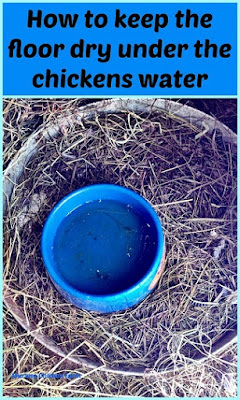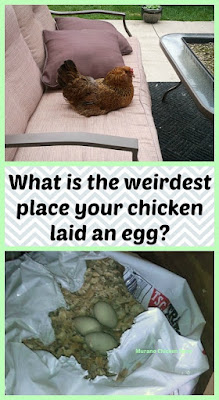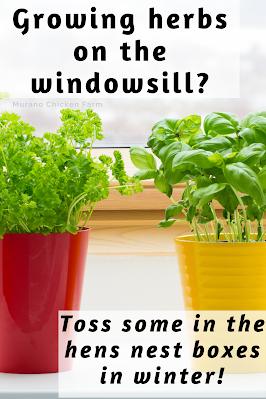Growing fodder for chicken feed (cheaply)
I've seen some beautiful fodder systems, but many of them seem to be either very expensive to build (yes, I said build) or they happen to have access to a lot of raw materials that most of us don't have. I have to say I am mighty impressed with the automatic watering systems some have set up, but I can't wire a darn thing to save my life!
So let's start with the easy-peasy cheap way to do it.
Living The Country Life interview
Country View: Lisa Murano - Tick Control with Guinea Fowl - Boyers, PA.
I also did a podcast interview with Scott of North County Farmer right after I wrote the article How to make $1,000 a month with just 15 chickens.
How to keep the chicken coop floor dry under the waterer
I've tried putting the waterer up on blocks so the coop bedding doesn't get kicked in. I've tried putting the poultry waterer outside the coop (but I worried too much about them getting thirsty before I get up in the morning) We tried different types of drinkers and bowls, bottles and cups.
We tried pretty much everything we could find, and the bedding was still wet underneath the water font! A little bit of wet bedding isn't a big deal, but once it gets a little wet...it spreads and spreads till the whole floor is soaked. Yuck!
As if the wet bedding isn't enough of a problem, the floor underneath it is wood. Eventually wet wood starts to rot. That is all I need is a rotted spot on the coop floor! Not only would that be expensive to fix but I have to worry about predators finding it and tunneling into the coop before I can get it fixed! No thanks!
I needed to find a solution before the coop floor was ruined. Luckily I have some experience Using household objects in the chicken coop, so a solution wasn't far away!
New roo for the Silkie pen
Weirdest place to lay an egg
Weird places that chickens lay eggs....
We've found eggs: behind the coop, under the coop, in the wheelbarrow full of dirty bedding, in the dust bathing box, in the pile of straw bales, in a bag of fresh shavings, between the cornstalks, under the tarp covering the woodpile and even on the patio furniture!
My chickens can't be the only ones doing this. I think it's far more widespread then my backyard. I'm pretty sure chickens all over the world are laying eggs in strange places and I'm on a quest to find out the strangest place an egg has been laid.
It's a funny question, I know...but my Muffy always tried to lay her eggs on the patio furniture!
Winter nest box herbs
I'm a gardener....and a bit of a foodie. Fresh ingredients are important to me and of course a huge garden is an important part of our summers around here. In the winter I bring some pots of herbs in so I can have my favorites all winter long. I always have basil, parsley and chives growing on the window sill. This year I added lemon balm.
What I didn't realize about lemon balm is that I wasn't going to get enough from a small plant for teas, or really any other recipe. Since I wasn't using it I wasn't trimming it back. This caused the lemon balm to start dying off.
That's when I remembered an article that came to my email last year from Grit Magazine. Nesting box herbs for in the chicken coop. You simply snip some pieces of whatever herb you want to use and toss them in the nesting box.Germ free poultry handling
I know a lot of us know most of these things anyway, but it never hurts to be reminded. The only ones I ever have an issue with is the last two. The rest I do regularly. (I have hand sanitizer everywhere! lol)
Now excuse me while I go tell Sally that when I'm eating on the patio, she is not supposed to try to take a bite out of my food!
>Related reading: what is Avian Influenza and how to keep your chickens safe.
~L
Want information on raising chickens sent right to your email weekly? Click right here to join my list and get new posts sent directly to you the day they're published. You'll also get the free download 25 Ways to save money raising chickens.
I am not a veterinarian or other animal care professional nor do I claim to be. I am simply passing on information that has worked for me and my flock. This information is for entertainment purposes only and is not meant to treat or diagnose any medical condition. Please see a vet if your chicken is ill. Click for my full disclaimer.





.jpg)


